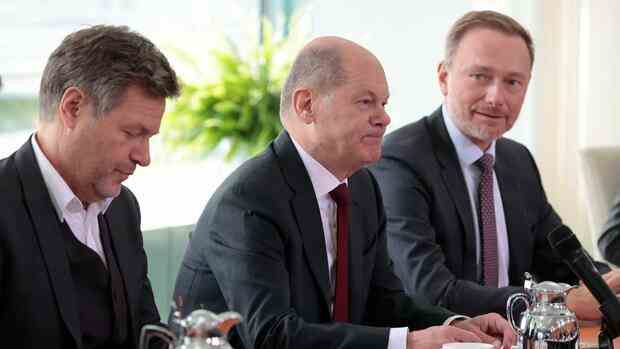The traffic light coalition partners expect no more recession for 2023.
(Photo: IMAGO/Metodi Popov)
Berlin In its latest economic forecast, the federal government expects only a slight increase in the unemployment rate. It is expected to rise to 5.4 percent in 2023. The forecast can be found in the annual economic report that the cabinet will approve on Wednesday. The report is available to the Handelsblatt.
The government expects price-adjusted exports to grow by just 2.2 percent in 2023 and imports by 1.6 percent. Overall, the federal government does not expect a recession in 2023, gross domestic product (GDP) is expected to grow by 0.2 percent, as the Handelsblatt and the Reuters news agency reported last week.
Nevertheless, the economic situation is still bad. This applies in particular to the development of investments. These are urgently needed for the transformation of the economy. However, the high prices ensure that there is often no money left for these expenses.
For example, the federal government expects that investments in the German economy will not grow in 2023. According to the annual economic report, price-adjusted gross fixed capital formation should stagnate compared to the previous year.
Top jobs of the day
Find the best jobs now and
be notified by email.
The government expects a slight increase in investment in equipment, which is expected to grow by 3.3 percent after 2.5 percent in the previous year. In order to boost investment, the federal government proposes several tax measures in the report.
During the corona pandemic, the federal government introduced the option of “declining balance depreciation of movable assets”. The regulation not only covers portable or mobile things, but the majority of all investments – such as machines or operating and office equipment.
The government is planning further tax breaks for the economy
With the degressive method, the annual depreciation amount is significantly higher at the beginning than with the usual straight-line depreciation. The advantage for the entrepreneur: he or she can deduct more from the tax sooner, the investment pays off more quickly than with linear depreciation, which provides for even amounts throughout the depreciation period.
The declining balance method of depreciation was still permitted until last year, but it has now expired – for now. The Greens around Economics Minister Robert Habeck have actually alienated with the degressive depreciation. Their problem: The method stimulates investments in all goods equally, including those that are not good for the climate.
>> Also read here: The federal government assumes export risks for medium-sized companies
Now the federal government wants to examine whether the degressive depreciation should be extended again. The annual economic report speaks of a “bridging solution”.
In addition, the government is introducing a “tax incentive for building up reserves” to create incentives to prepare for future crises. The federal government should review the existing tax regulations on the formation of reserves for possible adjustments.
The reserves are primarily about building up an equity buffer in order to be prepared for sudden business collapses, such as at the beginning of the corona pandemic. One possibility would be to extend the tax exemption of certain reserves. “This applies in particular to safety-related goods and can also serve to secure future-oriented investments,” says the annual economic report.
The simplified loss carryback could be extended
Loss offsetting allows companies to offset accrued profits against earlier or later losses in order to reduce the tax burden. As with depreciation, the federal government had expanded the options for this as a result of the corona pandemic. This gives companies relief, in particular, because they can claim losses from the peak of the pandemic more easily and for longer.
>> Also read here: The six biggest injustices for taxpayers in Germany
The annual economic report now contains a proposal to extend the simplification for this so-called loss carryback again. So far, it has been possible until the end of 2023 to claim the carryback for not just one, but for two years.
It was also expanded from one million to ten million euros. According to the report, the loss carryforward could also be made more attractive by temporarily raising the limit. In this way, companies can offset losses later.
More: Sandra Detzer is the new economic policy spokeswoman for the Greens.
